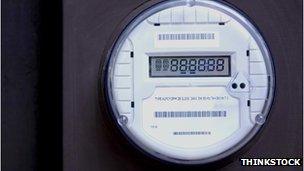Warning over smart meters privacy risk
- Published

Smart meters are able to upload data about consumers' energy use to third parties
An EU data watchdog has warned of the "considerable risks" to privacy posed by new energy smart meters.
The European Data Protection Supervisor said safeguards were needed over how firms used the "massive collection" of consumers' data uploaded by meters.
The technology is able to track when consumers are at home, how they spend their free time and even what medical devices they use.
UK energy firms and ministers say consumers' privacy will be protected.
But campaign group Privacy International said proposed safeguards did not go far enough.
Fraud detection
The government is currently consulting over privacy safeguards on smart meters, due to be installed in 30 million UK homes by 2019.
It says consumers should have the option of deciding whether they share detailed information about their use of gas and electricity.
Consumers may be able to opt out of sharing their information on a daily basis, and opt in to sharing more frequently gathered data.
But the EDPS proposed safeguards go further, recommending "freely given, specific, informed and explicit consent" of all use of their data that goes beyond the need for energy billing, fraud detection and the information necessary to run an energy-efficient grid.
<link> <caption>The EDPS report</caption> <url href="http://www.edps.europa.eu/EDPSWEB/webdav/site/mySite/shared/Documents/Consultation/Opinions/2012/12-06-08_Smart_metering_EN.pdf" platform="highweb"/> </link> voices concern over the "potential intrusiveness" of smart meters, which it says can track what members of a household do in the privacy of their homes.
It says smart meters are useful because they help suppliers plan the supply of electricity and gas more effectively, as well as allowing consumers to take advantage of lower price tariffs.
But the report highlights fears that regular frequent smart-meter readings, unless safeguarded, might also tell criminals when a house was unoccupied.
Third-party companies - like marketing firms - might be able to learn about consumers' sleeping patterns, whether they watched television or used certain tools, entertain guests or even used medical devices like dialysis machines.
The report adds: "Information about energy usage can have high commercial value."
'Consent'
A spokesman for Energy UK, which represents gas and electricity suppliers, said: "Consumer privacy is key to the introduction of smart meters and will be built in from the beginning.
"Customers will be able to get real-time information on their energy usage, but that will not be sent to their energy supplier.
"Only if they give their consent will more granular information be sent to the data communications company."
A spokesman for the Department of Energy and Climate Change said: "Under our proposals, suppliers would be able to access daily consumption data (for example to provide energy efficiency advice), but consumers would have the chance to opt out of this.
"Suppliers would need explicit (opt-in) consent to access the more detailed half-hourly data, or use data for marketing."
But Anna Fielder, from Privacy International, said the proposed safeguards needed to be toughened up in line with the EDPS recommendations.
She said: "As things stand, if you don't want your daily data uploaded you have to opt out.
"Suppliers will go for daily data collection and our experience tells us many people won't bother to opt out.
"We think people should have the right to opt into frequent data collection at every stage."
- Published17 January 2012
- Published17 January 2012
- Published8 March 2012
- Published10 April 2012
- Published15 January 2012